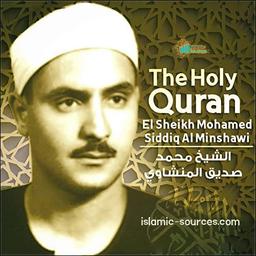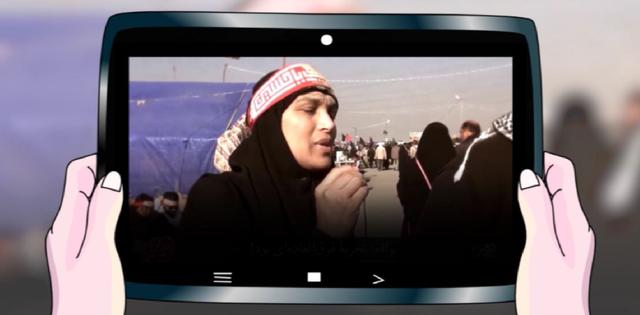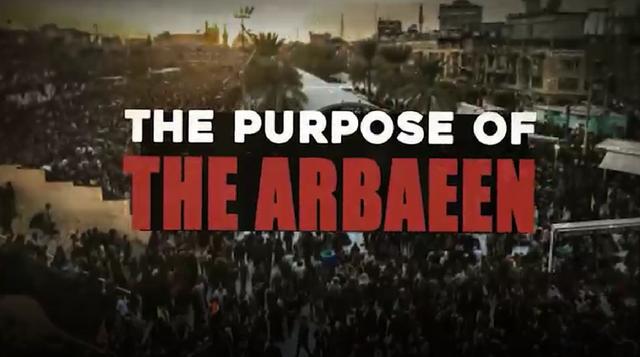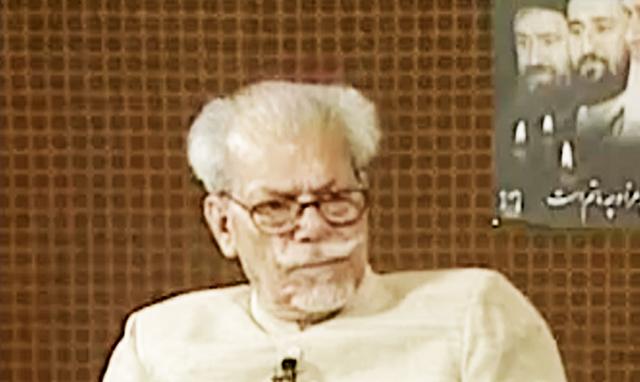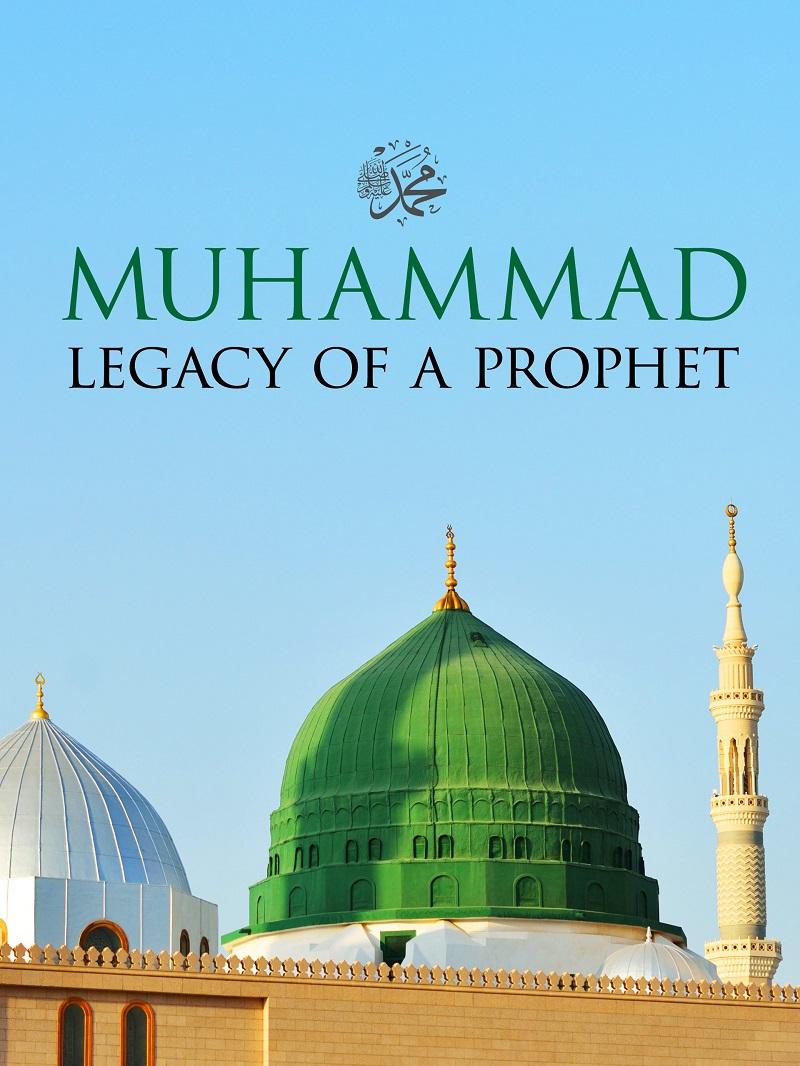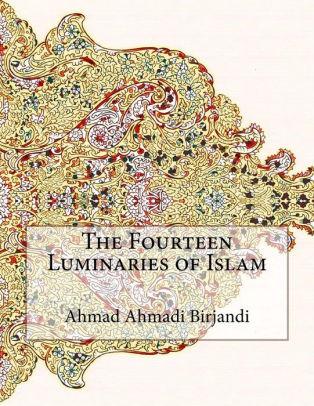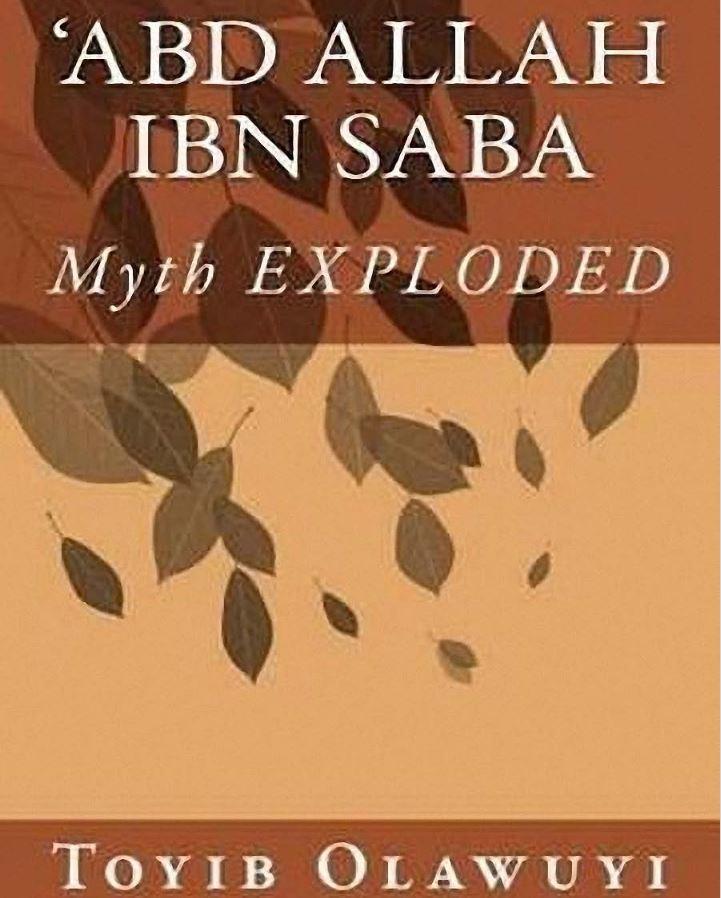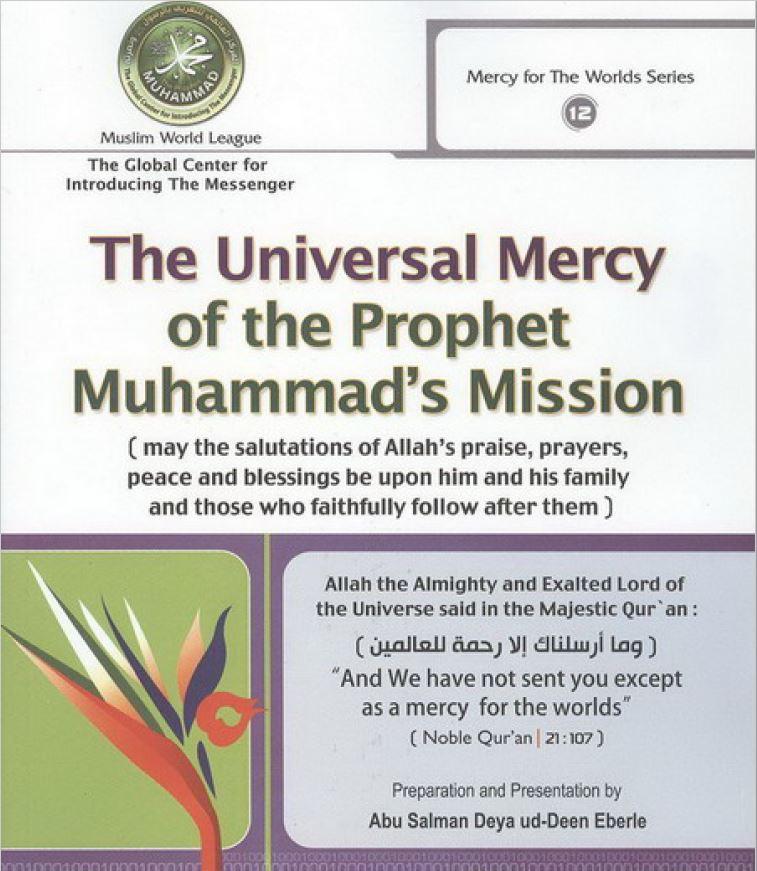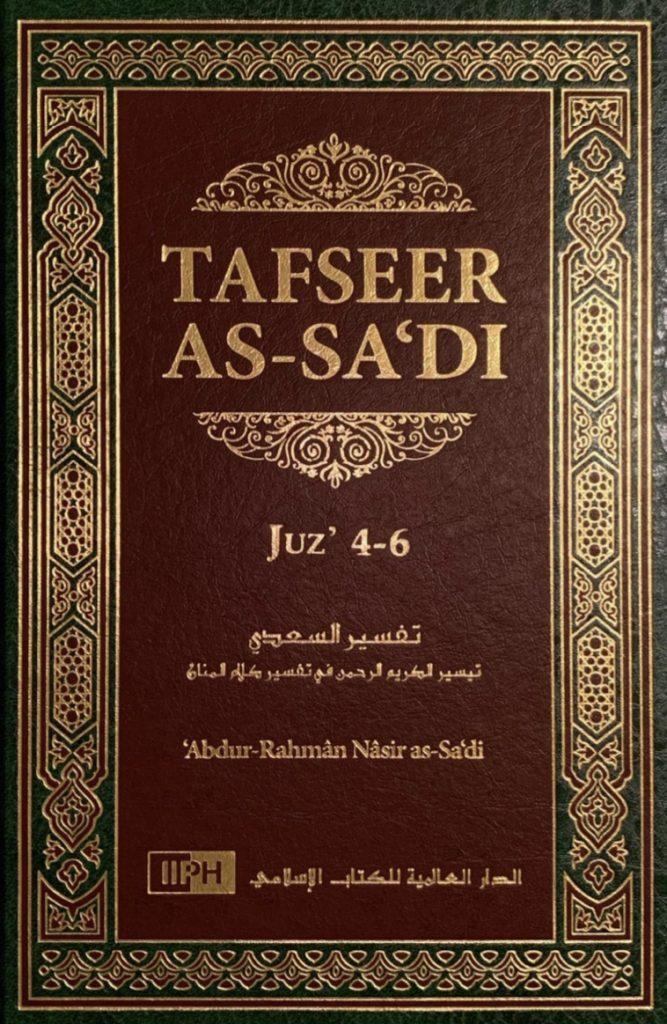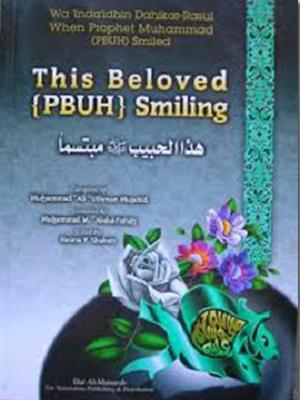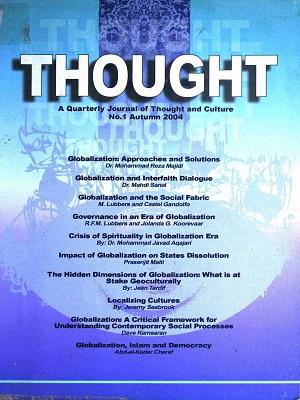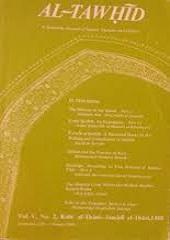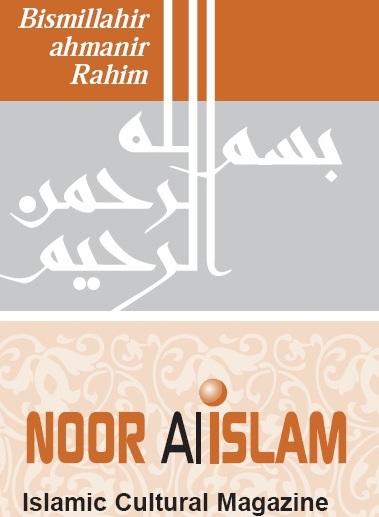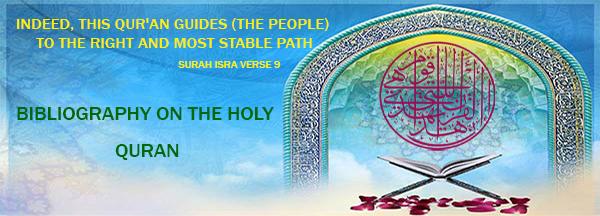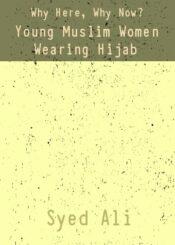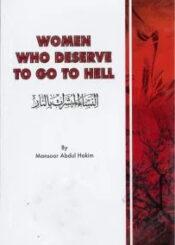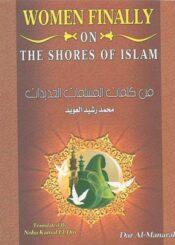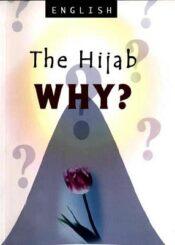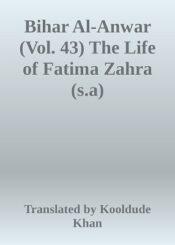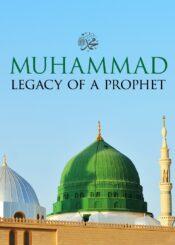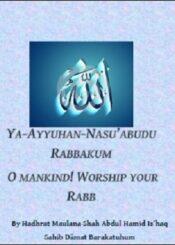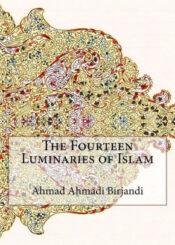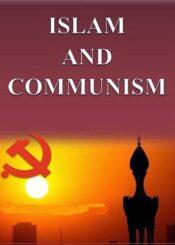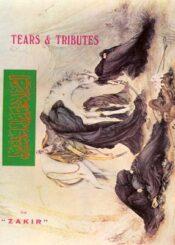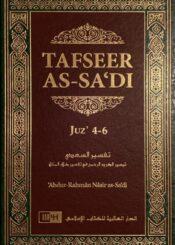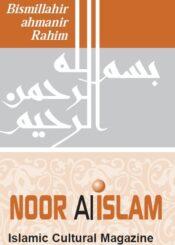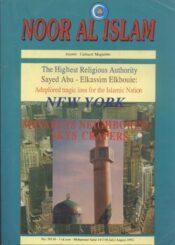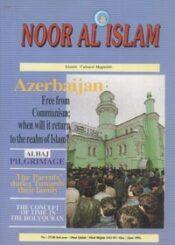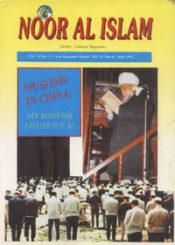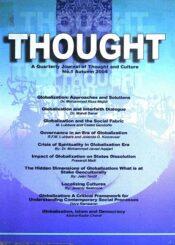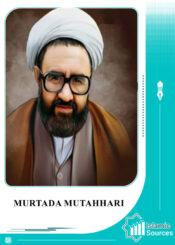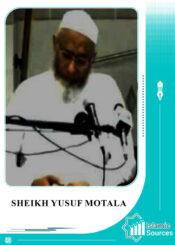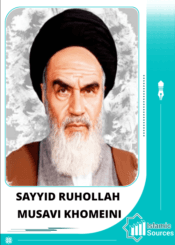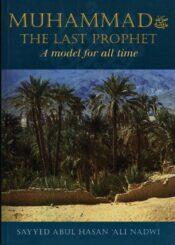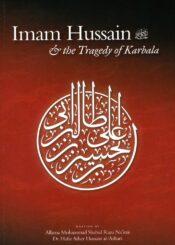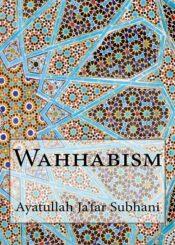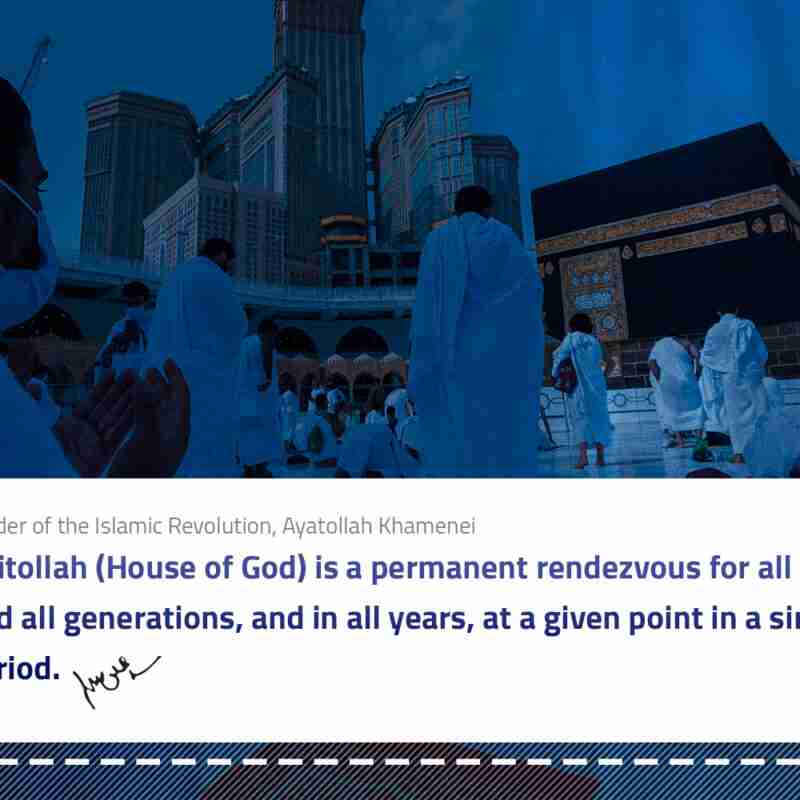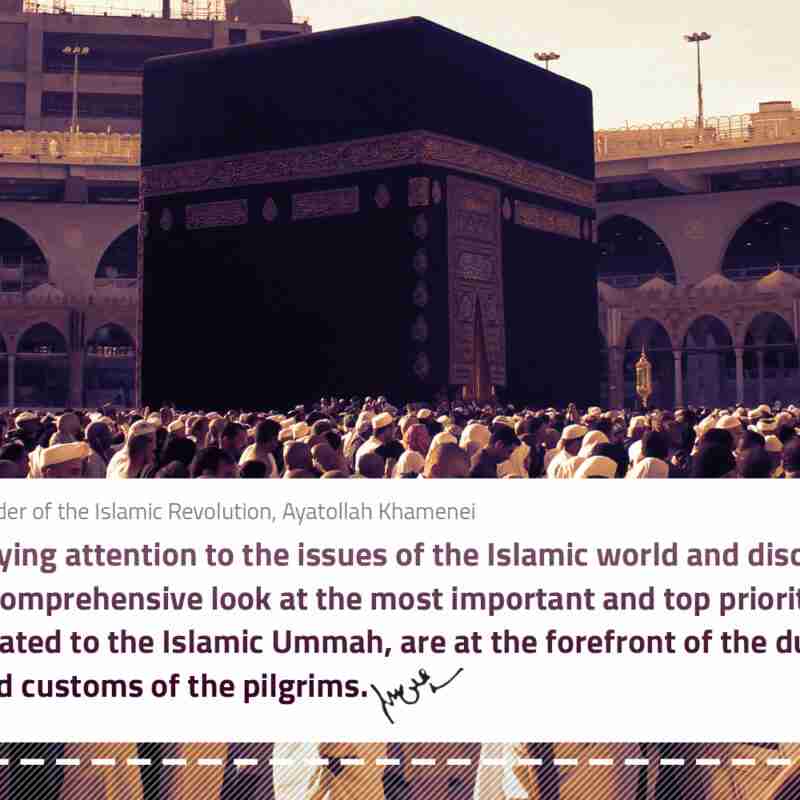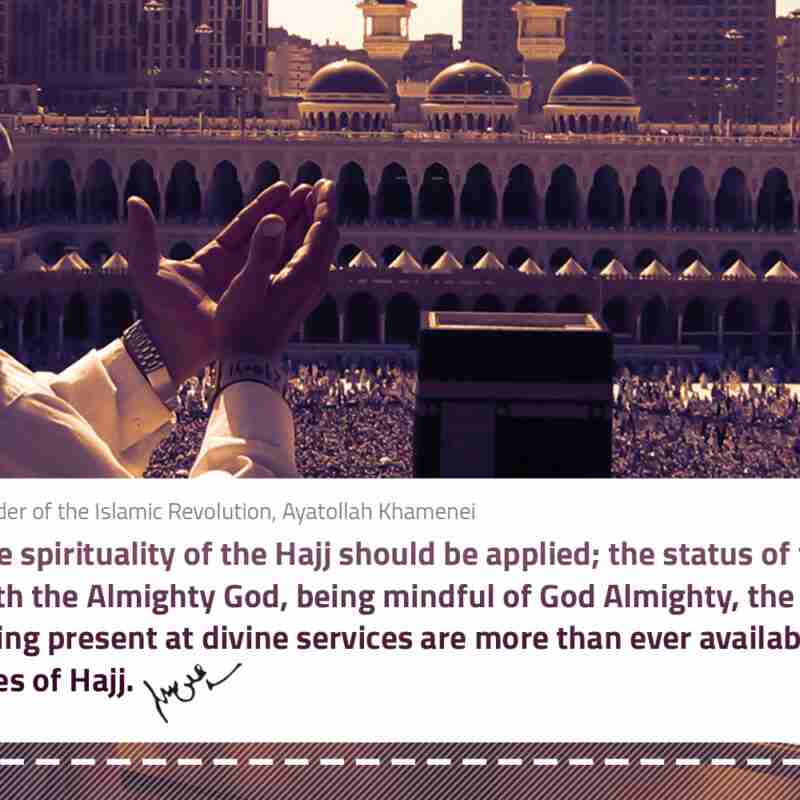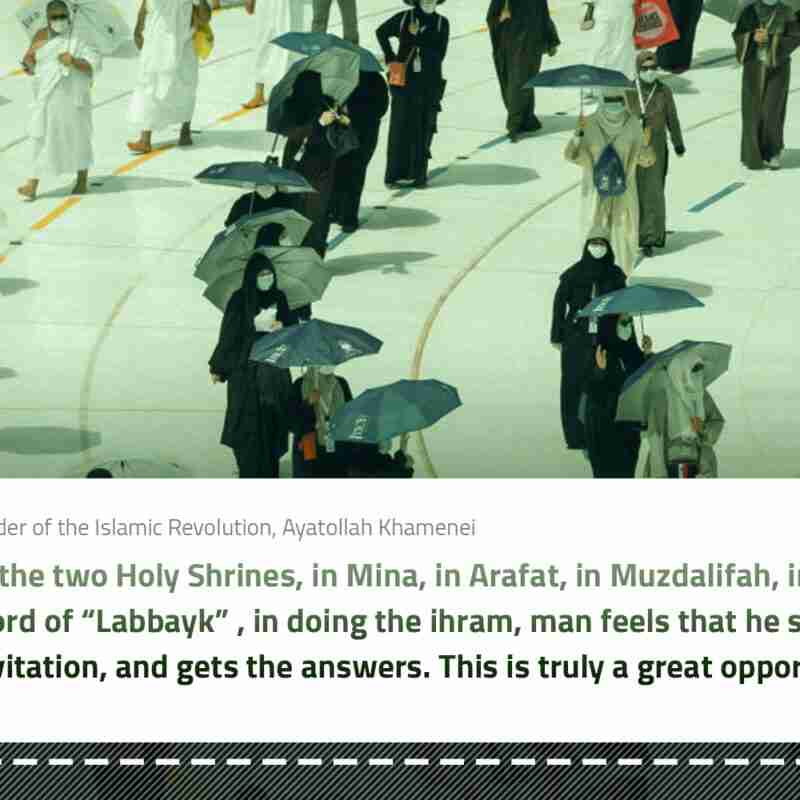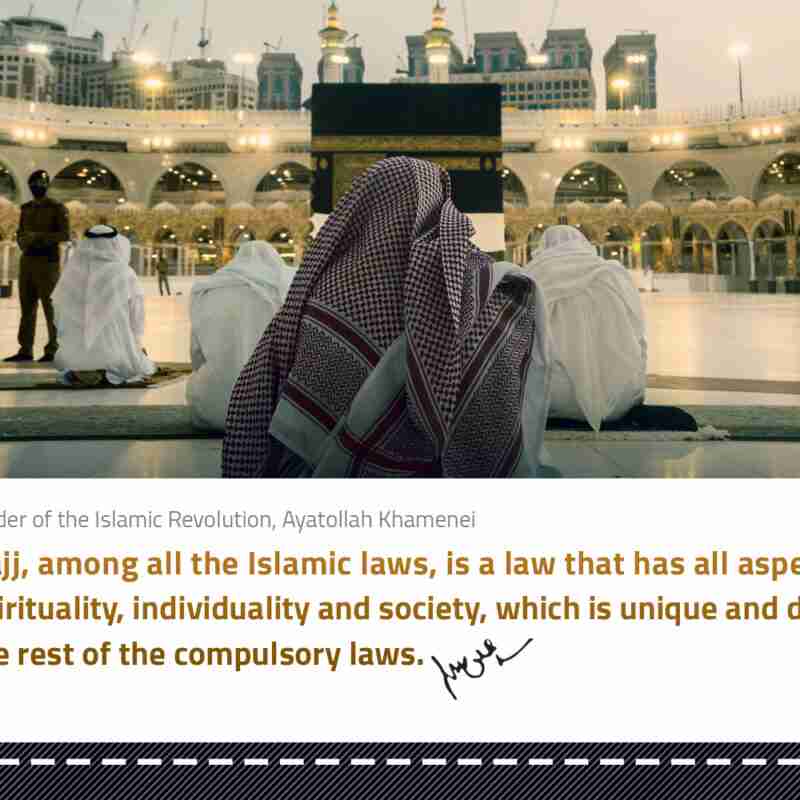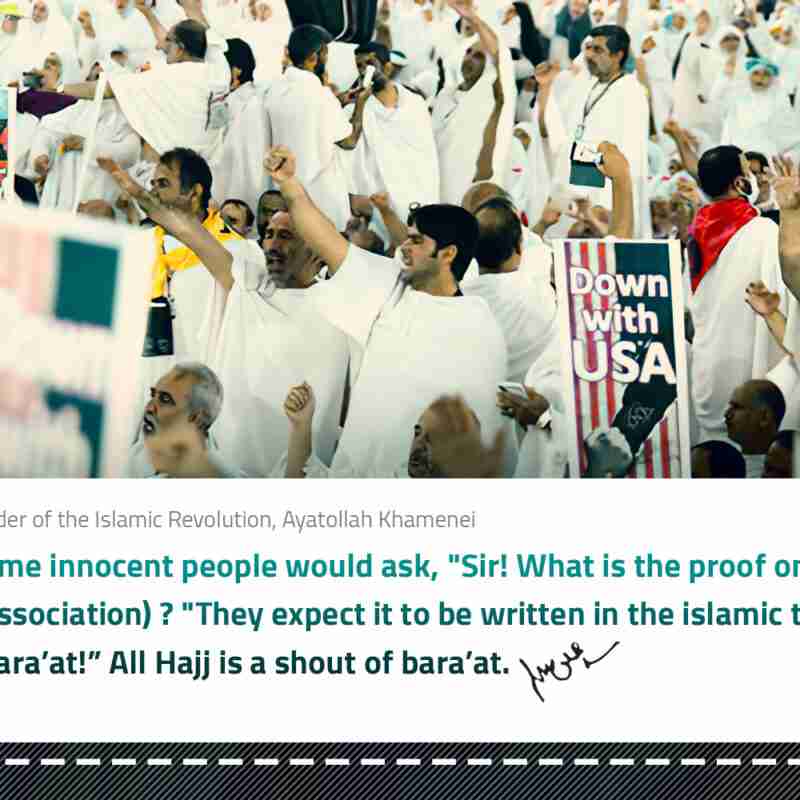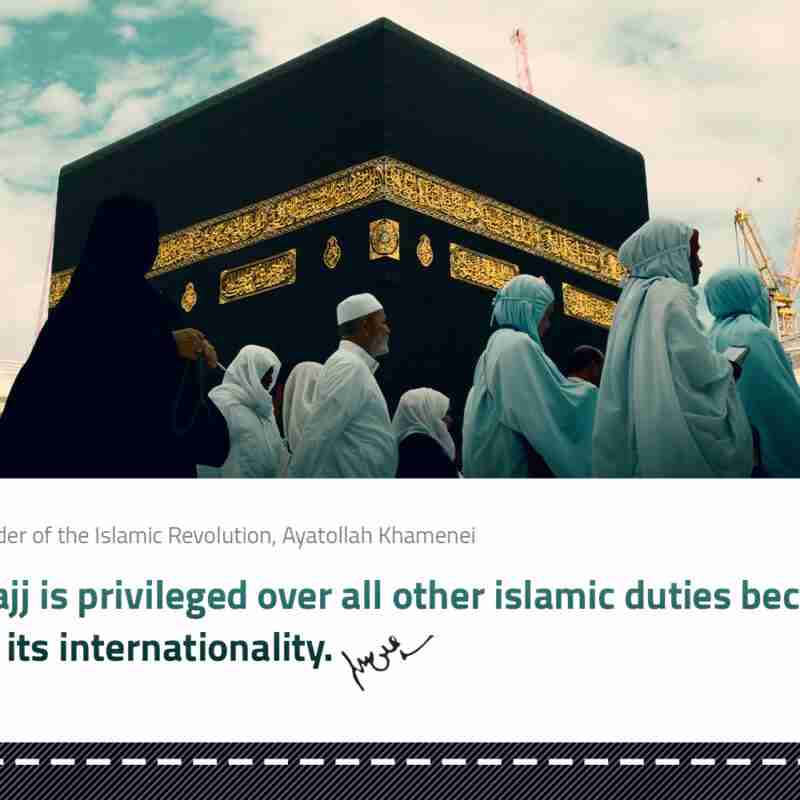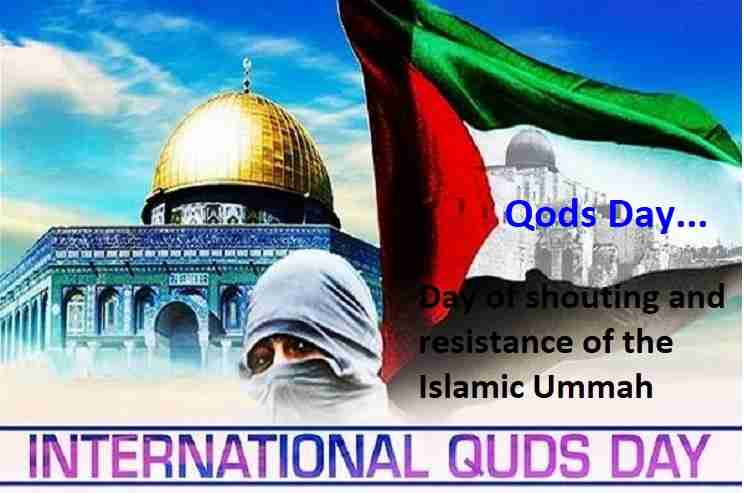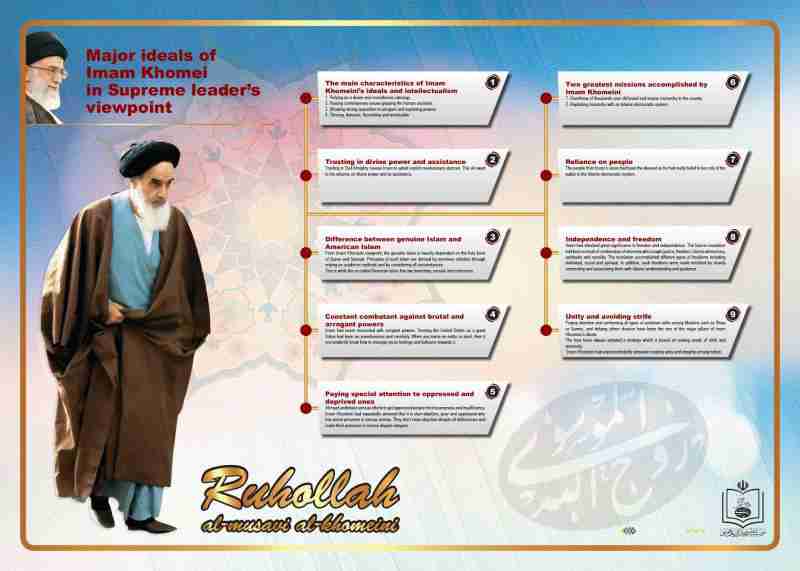Sayyid Ruhollah Musavi Khomeini
Sayyid Rūhollāh Mūsawī Khomeinī (Persian: سید روح الله موسوی خمینی), the best known as Imām Khomeinī (Persian: امام خمینی), was one the most important Shi'a marja's of the 14th//20th century. He was the leader of the Islamic Revolution in Iran, which won victory in 1979 and overthrew the monarchy and established an Islamic republic in Iran.
He was arrested twice by the monarchical Pahlavi government and was exiled for life in the latter. For a while, he lived in Turkey, then he moved to Najaf. He stayed in Najaf for 13 years teaching, writing and leading the revolutionists in Iran. In 1979, he was forced to leave Iraq; so he went to Paris. After a while, he returned to Iran and led the Islamic Revolution to victory. He was the leader of the Islamic Republic of Iran to the end of his life.
Imam Khomeini's movement and the victory of the Islamic Revolution had several impacts on the world and led to establishment of political movements based on Islamic thoughts. The doctrine of al-Wilayat al-Mutlaqa li l-Faqih (absolute guardianship of the jurist), a political doctrine based on Shi'a beliefs, is his most important doctrine. He tried to establish the Islamic Republic of Iran and its constitution based on this doctrine.
He believed that the common way of ijtihad in Hawza is not sufficient. From his point of view, governing was the practical realization of all fiqh. Having this viewpoint about fiqh, he believed in innovation in Ijtihad beside emphasizing on keeping the frames of traditional fiqh. His doctrine about the impact of the time and place on ijtihad and some of his influential fatwas can be counted as results of this point of view.
Muslims, especially Shi'as, liked him very much. His funeral, with participation of almost 10 million people, was the most crowded funeral in the world up to now.
In addition to fiqh and usul -which are the common subjects in Islamic seminaries- he had works and special opinions in Islamic philosophy and mysticism.
Imam Khomeini, also taught Islamic ethics during his residence in Qom in the school of Faydiyya.
During his life, he lived a plain and ascetic life. In the last 10 years of his life, when he was the supreme leader of the Islamic Republic of Iran, he lived in a humble house located in Jamaran (a district of Tehran.)
He was born in Jumada II 20, 1320 (September 24, 1902) in Khomein, a city located in central Iran. (Because he was born on the anniversary of the birthday of Lady Fatima al-Zahra (a), the anniversary of his birthday is counted according to lunar calendar exceptionally.)
His father, Sayyid Mustafa Musavi, who had studied Islamic subjects in Najaf, was contemporaneous with Ayatollah Mirza Shirazi. His father, whom the people of Khomein referred to for their religious issues, was murdered five months after Sayyid Ruhollah's birth in a fight against the brutal local governor.
Sayyid Ruhollah grew under the supervision of his mother, Hajara Agha, and his paternal aunt Sahiba Khanum, until he was 15.
Education
He studied preliminary level of Islamic studies -including Arabic morphology and syntax, mantiq (logic), basic level of fiqh and usul- under the teachers and scholars of his hometown, Khomein, such as: Aqa Mirza Mahmud Iftikhar al-'Ulama, Mirza Rida Najafi Khomeini, Shaykh 'Ali Muhammad Burujirdi, Shaykh Muhammad Ghulpayghani, Aqa 'Abbas Araki, and more than everyone, his elder brother, Ayatollah Murtada Pasandidi.
Study in Arak and Qom
In 1338/1919, he went to Islamic Seminary of Arak. Shortly after his teacher, Shaykh Abd al-Karim Ha'iri Yazdi, emigrated to Qom, he also moved to Qom along with a number of his classmates.
In the Islamic Seminary of Qom, in addition to completing the preliminary and advanced levels in fiqh and usul (Kharij fiqh and usul), he worked on other fields of Islamic study, including prosody, mathematics, astronomy, and Islamic philosophy. He studied advanced levels of theoretical and practical mysticism (al-Irfan al-nazari wa l-amali) under Ayatollah Muhammad Ali Shahabadi for six years. He also had a relationship with Ayatollah Mirza Javad Maliki Tabrizi and spoke well of him.
The founder of the seminary of Qom, Ayatollah Shaykh Abd al-Karim Ha'iri Yazdi, was his most important teacher in the advanced levels of fiqh and usul.[4] After the demise of Ayatollah Ha'iri Yazdi, by the effort of Imam Khomeini and other mujtahids from Qom, Ayatollah Burujirdi, who later moved to Qom, was chosen as the head of the Seminary of Qom. In this period, Imam Khomeini was known as one of the greatest mujtahids and teachers in fiqh, usul, philosophy, mysticism, and ethics.
Teachers
Shaykh Abd al-Karim Ha'iri Yazdi (The founder of the seminary of Qom).
Muhammad Rida Shahi Isfahani (The author of Wiqayat al-adhhan).
Mirza Muhammad Ali Shahabadi
Mirza Javad Maliki Tabrizi
Sayyid Ali Yathribi Kashani
Sayyid Muhammad Taqi Khwansari
Mirza 'Ali Akbar Hikami Yazdi
Mirza Muhammad Ali Adib Tihrani
Teaching
Imam Khomeini spent a lot of years teaching fiqh, usul, Islamic philosophy, mysticism and Islamic ethics in the Islamic Seminary of Qom. His classes were held in different places in the town including: Faydiyya, Masjid A'zam, Masjid Muhammadiyya, Haj Mulla Sadiq School and Masjid Salmasi.
In Najaf, he taught Islamic subjects including advanced levels of fiqh for almost 13 years in Masjid al-Shaykh al-A'zam al-Ansari. It was during these years that he taught the theoretical basis of his doctrine, wilayat al-faqih, in several sessions for the first time.
According to his students, his class was one of the most important classes in the Seminary of Najaf. In some periods, the number of participants in his class reached 1200, among whom were tens of well-known contemporaneous mujtahids.
Students
Morteza Motahhari
Sayyid Muhammad Bihishti
Muhammad Fadil Lankarani
Muhammad Hadi Ma'rifat
Ja'far Subhani
Sayyid Mustafa Khomeini
Husayn Ali Muntaziri
Yusuf Sani'i
Sayyid Ali Khamenei
Sayyid Mahmud Hashimi Shahrudi
Sayyid Abbas Khatami
Husayn Rasti Kashani
Muhammad Ali Girami
Works
Works in Ethics and Mysticism
Sharḥ du'a saḥar (Arabic) [Commentary of Sahar supplication], Tehran, The Institute for Compilation and Publication of Imam Khomeini's Works, 2015
Miṣbāḥ al-hidāya ilā al-khilāfa wa al-wilāya (Arabic), [Torches of Guidance toward Caliphate and Wilaya], Tehran, The Institute for Compilation and Publication of Imam Khomeini's Works,
Liqā' Allāh (Persian) [Meeting God]
Sirr al-ṣalāt [The Secret of Prayer], Translated into English by Bahram Afrasiabi, Tehran, The Institute for Compilation and Publication of Imam Khomeini's Works, 2009
Ta'līqāt alā sharḥ fuṣūṣ al-ḥikam (Arabic), [Gloss on the commentary of Fusus al-hikam], Qom, The Institute of Pasdar-i Islam, 1990.
Ta'līqāt alā miṣbāḥ al-uns (Arabic), [Gloss on Misbāh al-'uns], Qom, The Institute of Pasdar-i Islam, 1990.
Ta'līqāt alā sharḥ ḥadīth ra's al-jālūt (Arabic), [Gloss on commentary of the Hadith Ra's al-jalut], Tehran, The Institute for Compilation and Publication of Imam Khomeini's Works, 1997, ISBN:964-335-008-8
Sharḥ ḥadīth ra's al-jālūt (Arabic), [Commentary of the Hadith Ra's al-jalut],
Tafsīr-i sūra ḥamd (Persian), [Commentary of Sura al-Hamd]
Al-Hāshīya alā al-asfār (Arabic) [Marginal notes on al-Asfar]
Adāb al-Ṣalāt (Persian) [Manner of Prayer], Tehran, The Institute for Compilation and Publication of Imam Khomeini's Works, 1994
Mubāriza bā nafs yā jahād akbar (Persian), [Struggle with Soul or Greater Jihad], Tehran, The Institute for Compilation and Publication of Imam Khomeini's Works, 1994
Shraḥ ḥadīth junūd aql wa jahl (Persian), [Commentary on the Hadith of army of intellect and ignorance], Tehran, The Institute for Compilation and Publication of Imam Khomeini's Works, 2010
Sharḥ-i Arba'īn ḥadīth (Persian), [Commentary of Forty Hadith],Tehran, The Institute for Compilation and Publication of Imam Khomeini's Works, 2014
Books in Demonstrative Jurisprudence
Kitāb al-tahāra [Book in Cleanness], Qom and Najaf, The Institute for Compilation and Publication of Imam Khomeini's Works, Two volumes published in 1957 in Qom, Two other volumes in 1969 in Najaf,
Al-makāsib al-muḥarrama [Forbidden Earnings], Tehran, The Institute for Compilation and Publication of Imam Khomeini's Works, 1994
Kitāb al-bay' [Book of Selling], Tehran, The Institute for Compilation and Publication of Imam Khomeini's Works, 2010
Kitāb al-khilal [Book of Imperfection in prayer], Tehran, The Institute for Compilation and Publication of Imam Khomeini's Works, 2003
Risālat fī al-taqiyya [Treatise in Taqiyya (Precautionary Dissimulation)]
Risālat fī qā'ida man malik [Treatise in the Rule of Possession]
Risālat fī ta'īn al-fajr fī al-layālī al-muqmira [Treatise in distinguishing Fajr (dawn) in moonlight nights], Qom, 1989
Risālat lā ḍarar [Treatise in La Darar], Qom, The Institute for Compilation and Publication of Imam Khomeini's Works, 2007
Risālat al-istiṣḥāb [Treatise in Istishab (presumption of continuity)], Tehran, The Institute for Compilation and Publication of Imam Khomeini's Works, 2007
Risālt fī al-ta'ādul wa al-tarājīḥ [Treatise in al-Ta'adul wa al-Tarajih (balance and preferences)],Tehran, The Institute for Compilation and Publication of Imam Khomeini's Works, 2010
Risālat al-ijtihād wa al-taqlīd [Treatise in al-Ijtihad wa al-Taqlid], Tehran, Uruj Publication, 2010
Risālat fī al-talab wa al-irāda [Treatise in Want and Will], Tehran, The Institute for Compilation and Publication of Imam Khomeini's Works, 2001
Ta'līqāt alā Kifāyat al-uṣul [Gloss on Kifayat al-usul], Tehran, The Institute for Compilation and Publication of Imam Khomeini's Works, 1994
Risāla dar muḍū'-i ilm al-uṣul [A Short Treatise on the Theme of the Principles of Jurisprudence]
Risala Amaliya or Non-Demonstrative Jurisprudence
Ta'līqāt alā al-urwat al-wuthqā (Arabic), [Gloss on al-Urwat al-Wuthqa], Tehran, The Institute for Compilation and Publication of Imam Khomeini's Works, 2002
Ta'līqāt alā wasīlat al-nājat (Arabic) [Gloss on the Mean of Salvation], Tehran, The Institute for Compilation and Publication of Imam Khomeini's Works, 2002
Ḥāshiya tawḍīḥ al-masā'il (Persian)
Risāla Nijāt al-ibād (Persian), [Treatise on People's Salvation], Tehran, The Institute for Compilation and Publication of Imam Khomeini's Works, 2006
Ḥāshīya risāla irth (Persian), [Marginal Notes on Irth Treatise], Tehran, The Institute for Compilation and Publication of Imam Khomeini's Works, 2007
Manāsīk ya dastur-i ḥajj (Persian)
Taḥrīr al-wasīla (Arabic), [The Manual of Fatwas], Tehran, The Institute for Compilation and Publication of Imam Khomeini's Works, 2013
Zubdat al-aḥkām (Arabic)
Tawḍīḥ al-masā'il (Persian), [The Manual of Fatwas], Tehran, The Institute for Compilation and Publication of Imam Khomeini's Works, 1999
Mulḥaqāt tawḍīḥ al-masā'il (Persian),
Istiftā'āt (Persian), [Religious Questions], Tehran, The Institute for Compilation and Publication of Imam Khomeini's Works, 2014
Ḥukūmat islāmi ya wilāyat faqīh (Persian)
Kashf asrār (Persian)
Risāla dar rijāl (Arabic)
Diwān she'r (Persian), [Collection of Poems], Tehran, The Institute for Compilation and Publication of Imam Khomeini's Works, 2005
Risāla-ie mushtamil bar fawā'idī dar ba'ḍī masā'il mushkila
Taqrirat (notes) of Imam Khomeini's Teachings
Tahdhīb al-uṣūl, Shaykh Ja'far Subhani,
Risāla fī qā'ida lā ḍarar yā nayl al-awṭār Shaykh Ja'far Subhani,
Risāla fī al-ijtihād wa al-taqlīd, Shaykh Ja'far Subhani,
Lubb al-athar yā risāla fī al-ṭalab wa al-irāda wa al-jabr wa al-tafwīḍ, Shaykh Ja'far Subhani,
Kitab al-bay'
Other Books
Ṣaḥīfa Imām (Persian), [Divine and Political Will], Tehran, The Institute for Compilation and Publication of Imam Khomeini's Works, 2000
Waṣīyyat Nāme Siyāsī Elāhī (Persian), [Divine and Political Will], Tehran, The Institute for Compilation and Publication of Imam Khomeini's Works, 2001
Rah-i Eshq
Bāde Eshq
